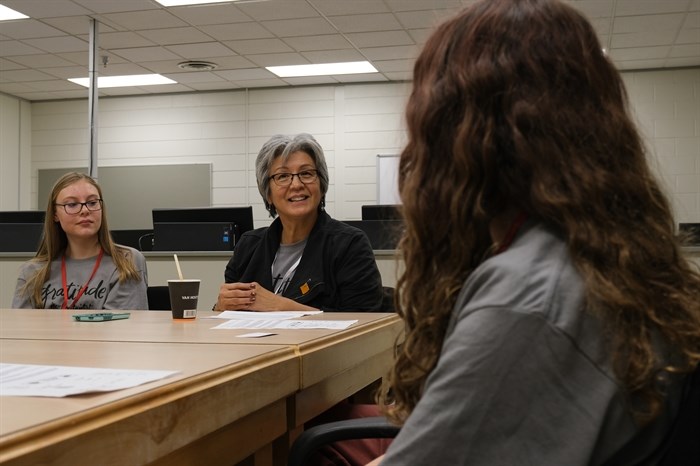
Maureen Ziprick (centre), speaks with students Morgan Shearer and Lyla Donn (right) about her residential school experience during Harmony Day in Kelowna.
(CARLI BERRY - WEEKEND EDITOR / iNFOnews.ca)
January 27, 2020 - 6:30 AM
Maureen Ziprick is a residential school survivor.
In 1966, when the Lake Country woman was seven-years-old, she was forced to attend Kamloops Indian Residential School for nine years.
Ziprick told stories of how her hair was cut, how she placed little faith in Christianity when a student mentioned church, and how she often questioned where her parents were during that time, not knowing the answer.
She spoke during a Living Library event with Central Okanagan middle school students for Harmony Day at the Hollywood Road Education Centre, Jan. 24. Harmony Day’s Living Library is put on yearly by the Central Okanagan Public Schools.
The event offers an opportunity for students to ask questions and for the “books” to break down prejudices and stereotypes.
One student asked if Ziprick talks with other residential school survivors and she replied that it’s challenging to do so because trauma can prevent an older generation from speaking out.
“I only remember the bad things, because with trauma, that’s what happens. It blocks your mind… you just move on with life,” she said.
For Ziprick, sports have been her passion and distraction from her trauma. She loved playing basketball and played fast ball for 30 years in Lake Country before finally retiring.
“The ball was coming a little too fast for me,” she said.
Having spoken about her residential school experience through presentations in public schools, she finds no question is too hard to answer from the students.
“I’m grateful for my resilience and that has been a big part of my life and I want to teach students how hard it was for us,” she said.
While she said the wound left from her residential school experience isn’t going to change, it’s her responsibility to accept it and move on.
“It really hurts me. I live with this on a daily basis and sometimes I will break down, but this whole thing with healing, I talk to other people. I am hurting but I can’t keep going to people and I can’t keep crying about it. I have to work on it, I have to accept it. I have to heal at some point in my life.
“The wound is always open, but I have to be the one to deal with it, live with it, eat with it, sleep with it. It’s part of me. I have to be the one to let go of the anger,” she said.
No apology from a federal government has meant anything to her, but she sees hope in the younger generation with a new curriculum that teaches Indigenous history and culture.
“We have been so stereotyped… and when you’re put on a reserve that has nothing… there are lots (of challenges that happen) with that,” she said.
“I have to help. I have to try and help people,” she said, adding that living libraries have been helpful for students to learn and understand the experiences of the past. “The students are the ones we need to tell because they are our ears. They’re the ones who are going to teach people about our history.”
While she can discuss her experiences openly, the older generation carries trauma.
“We have to remember how this trauma affects people,” she said. It was only five years ago that she learned her mother went to a residential school. Her grandfather also went.
“I think the biggest takeaway from this conversation was being able to experience in a different way how lives were changed by the residential schools... it deserves to be known,” said Dominique Miller, a Grade 7 student at Canyon Falls Middle School.
“Students have to see reserves as how they affected us,” Ziprick said. Only when people ask for help can they deal trauma, but that’s also a challenge, she said.
People sometimes ask if Ziprick is angry with her family when she went to the Kamloops residential school and she replies, “it’s not their fault.”
To contact a reporter for this story, email Carli Berry or call 250-864-7494 or email the editor. You can also submit photos, videos or news tips to the newsroom and be entered to win a monthly prize draw.
We welcome your comments and opinions on our stories but play nice. We won't censor or delete comments unless they contain off-topic statements or links, unnecessary vulgarity, false facts, spam or obviously fake profiles. If you have any concerns about what you see in comments, email the editor in the link above.
News from © iNFOnews, 2020